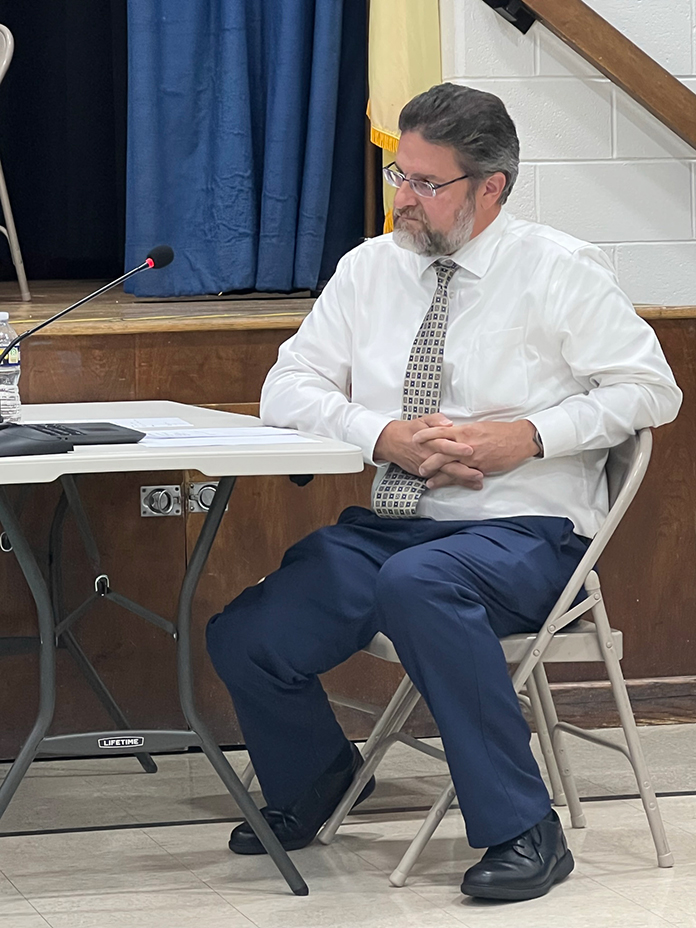
WARETOWN – The Township of Ocean Board of Education made it clear at a special meeting on September 21. They need voters to approve a ballot referendum and save the local schools.
Superintendent Christopher Lommerin emphasized the need boils down to ensuring there are enough teachers.
“Kids can’t get a good education without teachers,” Lommerin stressed. “We need teachers to teach children – that’s our business.”
What’s the alternative? Officials said eight classrooms will be empty rooms without teachers in them. Classroom sizes would near 28-30 children. The district could face consolidation and lose local control.
Simply put, the district wants approval for an increase of the school’s tax levy by $840,000. The average home in town has an assessed (not market) value of $271,534 and would experience a monthly tax raise of $14.19 or $170.24 annually.
The school district’s business administrator, Steve Terhune estimated that most of the homes in Ocean are assessed between 50 and 65 percent of their true market value. Taxpayers can consult the county’s website to determine the assessed value of their homes.
The additional funds represent the cost of keeping eight teachers in elementary school classrooms. Other staff positions have already been lost through attrition and not replaced. Federal COVID relief funds allowed the district to avoid cutting teachers last year.

A change in the statewide funding formula resulted in a series of cuts over the last few years that currently total $4.7 million. While the state continues to pay for the district’s preschool program, that’s a huge slash from the $19 million budget earmarked for K-6 schools and tuition costs to the Southern Regional School District for middle and high school students.
“The school funding formula to date did not have a substantial reduction in services, despite cutting millions from our operating budget,” began Dr. Shawn Denning, board president. “However, we have cut everything we can. Without additional funding and assistance from our local taxpayers, our students face increased class sizes and an additional reduction in services.”
Terhune presented a brief history of how schools are funded dating back to 1975. The recession of 2008 put the state in a position to freeze funding in 2010.
“For the first time in at least 35 years or longer, the state came and took money back from districts,” Terhune explained. “The state was very selective in how they did it. If districts had a larger fund balance which they were usually putting aside for building renovations, the state took that portion of the savings back and let to district figure out how to operate.”
The Township of Ocean wasn’t impacted by that round of funding constraints. However, legislative changes in 2018 created havoc locally and in a number of other districts.
The state funding formula has become the subject of several lawsuits. Three of the factors in the funding law include student enrollment, property values, and the local eco-level in the town.
Back in 2002-2003, the district’s enrollment level was just under 1,200 students, with 500 students in the elementary district buildings and the balance representing middle and high school students sent to the Southern Regional School District.
Local enrollment has decreased from 1,200 students to the mid-800 range in 2019 when recalculations were first made. The district now counts 818 students as part of its overall enrollment.
“The property values in town were just under half a billion in 2002-2003,” said Terhune. “We’re now just under $1.6 billion.”
It boils down to the state deciding that local taxpayers are essentially 30 percent undertaxed.
Meanwhile, Terhune provided documentation showing that the Township of Ocean is the second lowest cost K-6 district in Monmouth, Ocean, and Atlantic counties. Berkeley is the lowest at just $4 per student less.

With the proposed tax increase, Ocean Township school tax rates will be just a little higher than Stafford. School taxes will be 28 percent less than Barnegat, 26 percent less than Lacey and 9 percent lower than Berkeley.
According to Terhune, if the ballot question receives voter approval in November, the tax levy would be adjusted for the first quarter of 2023.
Alison Pohlman, president of the Waretown Educational Association, was at the informational session regarding the referendum vote. She asked voters for their support.
“What is at stake on November 8 is the ability for this town to have local control over its schools and for the students of Waretown to continue to have an exceptional level of education they have enjoyed for years,” said Pohlman. “Unfortunately, state cuts have made it more and more difficult to maintain our level of education and funding for our annual budget.
“We’re therefore asking you, the voters, who have enjoyed low taxes relative to your county neighbors,” Pohlman continued. “…If this referendum fails, we will be looking at much larger classroom sizes, loss of staff and in the near future potentially the loss of our own school district and local control.”






